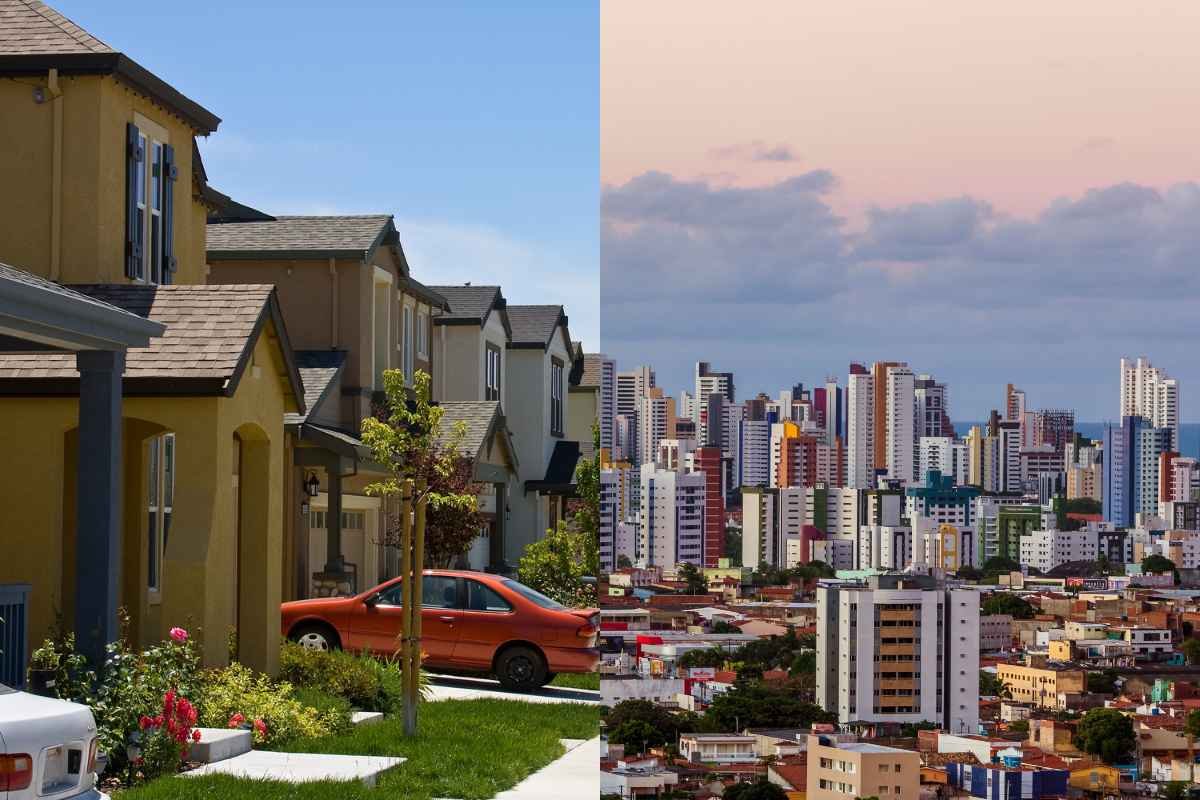Choosing between Suburbs and urban living can be daunting, depending on the life stage you’re at. It ultimately reflects on your lifestyle choices, financial considerations, and personal preferences. While both offer their own advantages, there are also certain challenges. Want to know which one between urban and suburbs will suit you better? This article will help you make a clear decision, with the pros and cons for both.
What Defines Suburban Living?
Suburbs are residential areas located on the outskirts of cities. When comparing suburbs vs urban life, one of the most notable differences is space. Suburban homes tend to be larger with more yard space, ideal for families or individuals seeking a quieter environment. The slower pace, coupled with more affordable housing options, makes suburban areas appealing to many, especially those looking to escape the fast-paced city lifestyle.
What Defines Urban Living?

Urban living is characterized by densely populated areas, typically within city centers. When comparing suburbs vs urban environments, cities offer more immediate access to cultural activities, entertainment, and career opportunities. However, urban life can also be fast-paced, noisy, and expensive, requiring some compromises in terms of space and cost of living.
Pros and Cons: Suburbs vs Urban Living
Each living environment has its own set of advantages and drawbacks. Below, we’ll break down the pros and cons of suburbs vs urban living to help you determine which suits your lifestyle best.
Benefits of Suburban Living
- More Space and Privacy
- One of the main attractions of suburban life is the increased space. Whether it’s a larger home, a big backyard, or the overall quieter streets, suburban areas offer a more spacious living environment.
- Lower Cost of Living
- Typically, housing in the suburbs is more affordable than in urban areas. This allows families to purchase larger homes at a lower cost, making suburban living a more budget-friendly option.
- Better School Systems
- Suburban areas are often known for having better-funded public schools, making it a popular choice for families with children.
- Green Spaces and Nature
- In the debate of suburbs vs urban, suburbs usually win when it comes to access to parks, recreational spaces, and nature. The open spaces provide opportunities for outdoor activities that are less common in urban settings.
- Quiet Environment
- Compared to the constant hustle and bustle of city life, suburbs offer a peaceful atmosphere, free from the noise of traffic, sirens, and crowds.
Drawbacks of Suburban Living

- Dependence on Cars
- Suburban residents often need to rely on personal vehicles for commuting, running errands, and even accessing basic amenities, as public transportation options are usually limited.
- Limited Entertainment and Social Options
- Suburban areas tend to have fewer restaurants, bars, and cultural attractions compared to urban centers. For those who enjoy vibrant nightlife or frequent events, suburban life can feel a bit too quiet.
- Longer Commutes
- If you work in a city, suburban living might involve long commute times, adding stress to your daily routine.
Benefits of Urban Living
- Proximity to Work and Amenities
- One of the biggest advantages in the suburbs vs urban debate is the accessibility urban living offers. Being close to work, entertainment, shopping, and dining is a huge plus for those who prefer everything within walking distance or a short public transit ride away.
- Cultural Experiences
- Cities are often cultural hubs, offering access to museums, theaters, restaurants, and festivals. The diverse range of experiences available in an urban setting is hard to match.
- Public Transportation
- Urban areas generally have extensive public transportation systems. This can eliminate the need for a car, reducing expenses like gas, insurance, and parking.
- Networking Opportunities
- For professionals, living in a city means being close to key industries, companies, and networking events, which can be advantageous for career growth.
- Diverse Social Scene
- If you enjoy meeting new people, dining at trendy restaurants, or attending concerts and other events, the urban lifestyle offers endless possibilities for social interaction.
Drawbacks of Urban Living
- High Cost of Living
- Urban living is typically more expensive. From rent to groceries to entertainment, the cost of city life can add up quickly.
- Limited Space
- Compared to the suburbs, urban homes are smaller and often more expensive. You may have to compromise on square footage and privacy when living in a city.
- Environmental Concerns
- Pollution levels tend to be higher in cities due to heavy traffic and industrial activity, making air quality a concern for some urban dwellers.
- Noise and Crowding
- Urban life comes with the constant hum of traffic, people, and general activity. For some, this can be overwhelming, especially if peace and quiet are a priority.

Suburbs vs Urban: Which Is Better?
When deciding between suburbs vs urban living, the right choice depends on your lifestyle, priorities, and personal preferences. Here are a few considerations to help you choose:
- Career Opportunities: If you’re focused on career growth and networking, urban living might offer better access to jobs and professional connections.
- Family Needs: Suburbs generally provide more space, better schools, and a safer environment for raising children.
- Social Life: If you thrive in a social, fast-paced environment, urban living offers more opportunities for interaction and entertainment.
- Commute Time: Suburban residents often face longer commutes, while urban dwellers can enjoy shorter travel times but may deal with traffic congestion and crowded public transit.
- Affordability: Suburbs usually provide more bang for your buck in terms of space, while urban areas tend to have a higher cost of living.
Final Thoughts: Finding the Perfect Balance
The suburbs vs urban debate ultimately comes down to your individual needs. For some, the quiet, family-friendly atmosphere of the suburbs is ideal, while others may be drawn to the excitement, convenience, and career opportunities found in the city. A balanced approach could involve choosing a suburban area that’s close enough to the city to enjoy the best of both worlds—affordable housing with easy access to urban amenities.
When weighing your options, consider your long-term goals, budget, and the lifestyle you want to lead. Whether you choose the hustle of city life or the calm of the suburbs, both environments have much to offer.










